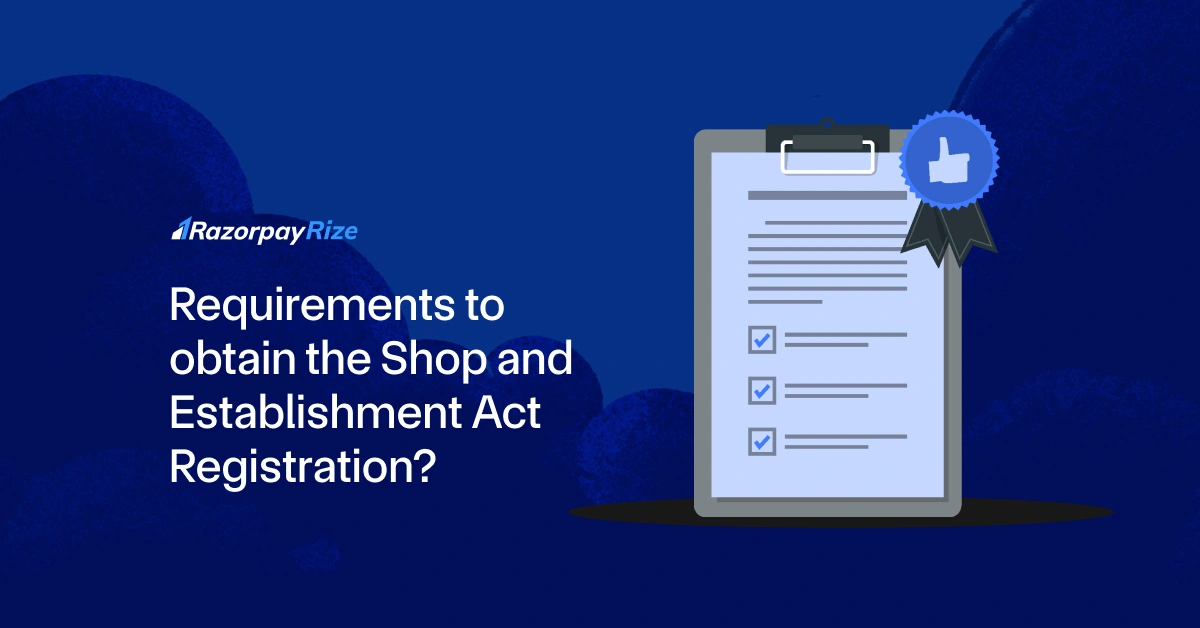The Shop and Establishment Act is a vital piece of legislation that governs the working conditions and employment terms in shops, commercial establishments, and other non-manufacturing businesses across India. As an entrepreneur or business owner, it's essential to understand the registration process and ensure compliance with the provisions of this Act, which are enforced by the respective State Labour Departments.
Obtaining the Shop and Establishment License is a mandatory requirement for most businesses operating in India. Whether you're setting up a retail store, restaurant, office, theatre, or even an online business, you'll need to register under the Shop and Establishment Act to legally operate in your state.
Table of Contents
The Shop and Establishment Act
The Shop and Establishment Act is a state-specific legislation aimed at regulating and standardising the working conditions in shops, commercial establishments, hotels, restaurants, and other service-oriented businesses. The primary objective of this Act is to ensure fair and humane treatment of workers by stipulating guidelines for:
- Work hours and overtime
- Minimum wages
- Leave and holiday policies
- Employee welfare and benefits
Since each state has its own version of the Act, the specific rules and regulations may vary depending on where your business is located. However, the core principles of employee protection and standardised work conditions remain consistent across all states.
Registration Under The Shop and Establishment Act
For most businesses in India, registration under the Shop and Establishment Act is mandatory. Any shop, commercial establishment, or service-based enterprise—whether physical, online, or home-based—must obtain this license within 30 days of starting operations, as per state-specific regulations.
The registration process involves submitting an application to the Chief Inspector or Labour Commissioner of your area, along with the required documents and fees. Upon verification and approval, you'll receive a Shop and Establishment License, which serves as proof of your legal compliance and is essential for:
- Opening business bank accounts
- Applying for loans and financial assistance
- Availing government schemes and benefits
Failing to obtain the necessary registration can result in penalties, fines, and legal consequences, so it's crucial to prioritise this process as you set up your business.
Setting up your business? Get expert help with Shop and Establishment Registration and Company Registration today.
Regulations Under The Shop and Establishment Act
To ensure fair and safe working conditions for employees, the Shop and Establishment Act lays down several regulations that employers must adhere to. Some of the key areas covered under the Act include:
- Work Hours and Overtime:
- Standard work hours for adults are typically limited to 8-9 hours per day and 48 hours per week.
- Overtime wages, usually double the regular rate, must be paid for work beyond the standard hours.
- Employees are entitled to a weekly off of at least 24 consecutive hours.
- Wages:
- Employers must pay wages on time, typically by the 7th or 10th of the following month, depending on employee count.
- Men and women must receive equal remuneration for the same work, as per the Equal Remuneration Act, 1976.
- Leave and Holidays:
- Workers are entitled to various types of leave, such as earned leave, casual leave, and sick leave.
- The number of leave days and paid holidays varies by state.
- Employee Welfare:
- Employers must provide basic amenities such as drinking water, clean toilets, first-aid kits, and a crèche (if employing more than 50 women).
- The workplace should be well-ventilated, adequately lit, and maintained at a comfortable temperature.
- Record-Keeping:
- Businesses must maintain proper records of work hours, leave, overtime, wages, and other employee-related data.
- Wage slips must be provided to employees every month, detailing their earnings and deductions.
- Display of Notices and Registers:
- The Shop and Establishment Registration certificate and an abstract of the Act must be prominently displayed in the local language.
- Employers must maintain registers such as appointment letters, service books, leave records, and wage registers.
By adhering to these regulations, businesses can create a safe, fair, and compliant work environment for their employees.
Eligible Businesses under the Shops and Establishments Act
The Shops and Establishments Act applies to a wide range of businesses, including but not limited to:
- Shops and retail establishments
- Commercial offices (e.g. legal, accounting, consulting)
- Service providers (e.g. IT firms, salons, courier services)
- Hotels, restaurants, and eateries
- Educational institutions and training centres (e.g. coaching centres, training institutes)
- Healthcare facilities and clinics (e.g. clinics, diagnostic centres)
- Entertainment and recreational centres (e.g. theatres, gyms, amusement parks)
However, the specific applicability may vary from state to state. For example, some states require registration for establishments with a minimum of 10 employees, while others have a lower threshold. Manufacturing units and factories are generally not covered under this Act, as they are governed by the Factories Act.
To ensure compliance, it's essential to verify your business's eligibility with your local state authority and adhere to the specific requirements laid down by your state's Shop and Establishment Act.
Requirements to obtain the Shop and Establishment Act Registration
To obtain the Shop and Establishment Act Registration, you'll need to apply along with the following documents and details:
- Business Information:
- Name and address of the establishment
- Nature of business activity
- Number of employees
- Working hours and shifts
- Proof of Identity and Address:
- Owner's identity proof (Aadhaar card, PAN card, etc.)
- Proof of business address (rental agreement, property deed, etc.)
- Other Documents:
- Partnership deed or incorporation certificate (for partnership firms and companies)
- Layout plan of the establishment
- List of employees with their details
- Consent letter from the property owner (if operating from rented premises)
- Registration Form:
- Duly filled and signed application form, which can be obtained from the local labour department or downloaded from their website.
- Fees:
- Registration fees vary by state and are typically based on the number of employees and the nature of the business.
Some states may have additional requirements, so it's essential to check with your local labour department for the exact list of documents and procedures specific to your state.
Process For Obtaining Shop and Establishment Registration
The process for obtaining the Shop and Establishment Registration may vary slightly from state to state, but the general steps involved are as follows:
- Visit the website of your state's labour department or the online portal for Shop and Establishment Act Registration.
- Fill out the online application form with the required details, such as:
- Employer name and contact information
- Establishment name and address
- Nature of business
- Number of employees
- Working hours and shifts
- Upload the necessary documents, as mentioned in the previous section, in the prescribed format (usually PDF or JPEG).
- Pay the registration fees online using a credit card, debit card, or net banking.
- Submit the application and wait for the labour department to verify your documents and details.
- Upon successful verification, you will receive the Shop and Establishment Registration certificate, either electronically or by post.
Alternatively, you can also opt for the offline process by visiting the local labour department office, submitting the physical application form, and paying the fees in person. However, the online process is generally faster and more convenient.
Once you obtain the registration certificate, make sure to display it prominently at your establishment and renew it before the expiry date to maintain compliance with the Act.
Validity of Shop And Establishment Registration
The validity of the shop and establishment license varies from state to state. Some states provide a lifetime registration, while others require periodic renewal. The renewal period can range from 1 to 5 years, depending on the state. Some states, like Maharashtra and Delhi, offer long-term or lifetime validity—up to 10 years or even 21 years—while others such as Karnataka, Tamil Nadu, and Uttar Pradesh require periodic renewal every 3 to 5 years. The registration fees also differ and are typically calculated based on the number of employees, the nature of the business, and the duration of registration selected.
It's crucial to keep track of your registration's validity and initiate the renewal process well before the expiry date to avoid any lapses in compliance. Renewal fees and procedures may also differ by state, so make sure to check with your local labour department for the most up-to-date information.
Conclusion
Registering under the Shop and Establishment Act is a vital step for any business operating in India’s commercial sector. It not only ensures legal compliance but also promotes transparent and fair employment practices. By understanding your state’s specific rules, maintaining accurate records, and renewing your registration on time, you can protect your business and your employees.
Compliance isn't just a legal formality—it's a foundation for sustainable growth and a responsible workplace.
Frequently Asked Questions
Private Limited Company
(Pvt. Ltd.)
- Service-based businesses
- Businesses looking to issue shares
- Businesses seeking investment through equity-based funding
Limited Liability Partnership
(LLP)
- Professional services
- Firms seeking any capital contribution from Partners
- Firms sharing resources with limited liability
One Person Company
(OPC)
- Freelancers, Small-scale businesses
- Businesses looking for minimal compliance
- Businesses looking for single-ownership
Private Limited Company
(Pvt. Ltd.)
- Service-based businesses
- Businesses looking to issue shares
- Businesses seeking investment through equity-based funding
One Person Company
(OPC)
- Freelancers, Small-scale businesses
- Businesses looking for minimal compliance
- Businesses looking for single-ownership
Private Limited Company
(Pvt. Ltd.)
- Service-based businesses
- Businesses looking to issue shares
- Businesses seeking investment through equity-based funding
Limited Liability Partnership
(LLP)
- Professional services
- Firms seeking any capital contribution from Partners
- Firms sharing resources with limited liability
Frequently Asked Questions
What documents are required for shop and establishment registration in UP?
- To register your shop or establishment in Uttar Pradesh, you'll need to submit the following documents:
- Duly filled application form
(Available online through the UP Labour Department portal) - Proof of business address
- Identity proof of the owner(s)
- List of employees
- Layout plan of the establishment
- Partnership deed or incorporation certificate (if applicable)
- Consent letter from the property owner (if operating from a rented premises)
- Duly filled application form
What are the documents required for shop and establishment registration in Maharashtra?
- In Maharashtra, you'll need to submit the following documents for Shop and Establishment Registration:
- Completed application form
- Proof of business address
- Identity proof of the owner(s)
- Partnership deed or incorporation certificate (if applicable)
- List of employees
- Layout plan of the establishment
- Fees as prescribed by the state
How do I get permission to open a shop?
- To obtain permission to open a shop, you'll need to follow these steps:
- Register your business under the Shop and Establishment Act by submitting the required documents and fees.
- Obtain any additional licenses or permits specific to your business.
- Ensure compliance with local zoning regulations and building codes.
- Apply for a GST registration if your annual turnover exceeds the prescribed threshold.
- Open a business bank account and maintain proper financial records.






%20to%20LLP%20in%20India.webp)









